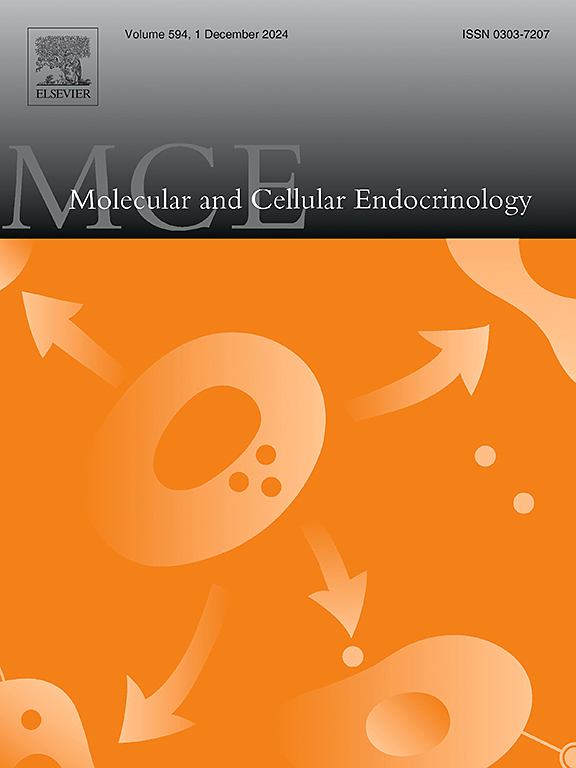HSF1/HSP25 系统可保护线粒体功能免受热应力影响,并协助 MA-10 Leydig 细胞的类固醇生成。
IF 3.8
3区 医学
Q2 CELL BIOLOGY
引用次数: 0
摘要
热休克反应的特点是诱导热休克蛋白(HSP)或分子伴侣,以维持蛋白质的平衡。热休克转录因子 1(HSF1)在哺乳动物细胞的热休克反应中发挥着核心作用。为了研究热休克反应机制对类固醇生成的影响,我们利用 CRISPR-Cas9 基因组编辑技术生成了缺失 HSF1 的 MA-10 小鼠雷迪格肿瘤细胞。在热应激条件下,与野生型细胞相比,HSF1基因敲除细胞中的StAR蛋白(而非其mRNA)水平下降更多,这证实了HSF1能稳定StAR蛋白。与此同时,HSP110、HSP70 和 HSP25 以依赖 HSF1 的方式显著上调。在热应激条件下,HSF1 基因敲除细胞的线粒体膜电位(MMP)和 ATP 合成减少,线粒体破碎增强。此外,用羰基氰-3-氯苯基腙(CCCP)(一种 MMP 破坏剂)处理后,HSF1-基因敲除细胞中 StAR 蛋白水平的降低程度大于野生型细胞,这与 MMP 和 ATP 合成的减少有关。出乎意料的是,在 CCCP 处理后,野生型细胞中 HSP25 的表达明显增加。敲除 HSP25 可减少热应激条件下的 MMP,降低 StAR 蛋白水平和孕酮合成。在 HSF1KO 细胞中过表达 HSP25 可恢复 StAR 蛋白水平。这些结果表明,HSF1/HSP25途径可保护线粒体功能并维持StAR的合成。本文章由计算机程序翻译,如有差异,请以英文原文为准。
HSF1/HSP25 system protects mitochondria function from heat stress and assists steroidogenesis in MA-10 Leydig cells
Heat shock response is characterized by the induction of heat shock proteins (HSPs) or molecular chaperones that maintain protein homeostasis. Heat shock transcription factor 1 (HSF1) plays a central role in heat shock response in mammalian cells. To investigate the impact of the heat shock response mechanism on steroidogenesis, we generated MA-10 mouse Leydig tumor cells deficient in HSF1 using CRISPR-Cas9 genome editing. Under heat stress conditions, the levels of StAR protein, but not its mRNA, decreased more in HSF1-knockout cells than in wild-type cells, confirming that HSF1 stabilizes StAR protein. Simultaneously, HSP110, HSP70, and HSP25 were markedly upregulated in a manner dependent on HSF1. Mitochondrial membrane potential (MMP) and ATP synthesis were decreased in HSF1-knockout cells under heat stress conditions, and mitochondrial fragmentation was enhanced. Furthermore, treatment with carbonyl cyanide 3-chlorophenylhydrazone (CCCP), a disruptor of MMP, reduced the levels of StAR protein to a greater extent in HSF1-knockout cells than in wild-type cells, which was associated with decreased MMP and ATP synthesis. Unexpectedly, HSP25 expression was markedly increased in wild-type cells following CCCP treatment. HSP25 knockdown reduces MMP under heat stress conditions and decreases StAR protein levels and progesterone synthesis. HSP25 overexpression in HSF1KO cells restored StAR protein levels. These results show that the HSF1/HSP25 pathway protects mitochondrial function and maintains StAR synthesis.
求助全文
通过发布文献求助,成功后即可免费获取论文全文。
去求助
来源期刊

Molecular and Cellular Endocrinology
医学-内分泌学与代谢
CiteScore
9.00
自引率
2.40%
发文量
174
审稿时长
42 days
期刊介绍:
Molecular and Cellular Endocrinology was established in 1974 to meet the demand for integrated publication on all aspects related to the genetic and biochemical effects, synthesis and secretions of extracellular signals (hormones, neurotransmitters, etc.) and to the understanding of cellular regulatory mechanisms involved in hormonal control.
 求助内容:
求助内容: 应助结果提醒方式:
应助结果提醒方式:


